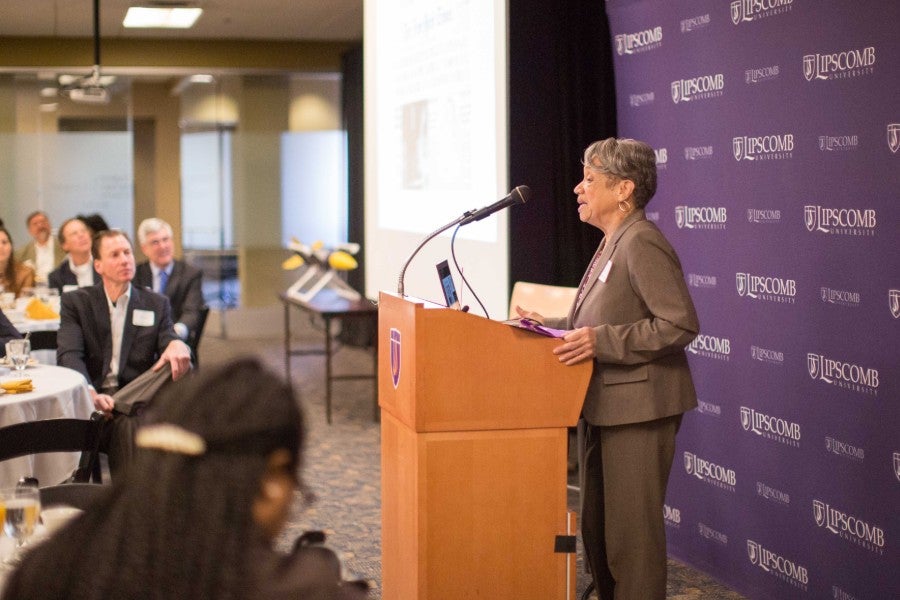NASA engineer and social pioneer inspires local engineers and students
Christine Darden motivates local engineers and students to break barriers at Global Day of the Engineer breakfast
Anna Moseley |

Christine Darden shares her experiences of her 40-year career at NASA’s Langley Research Center.
Engineering students, professors and professionals gathered at Lipscomb University for a Global Day of the Engineer breakfast celebration on Wednesday with keynote speaker Christine Darden sharing stories of the barriers she broke along her journey to becoming a NASA engineer and trailblazer for African American women in math and science.
“Dr. Darden was a preeminent researcher and broke through technical challenges as well as social and cultural barriers in a society that was not conducive to a person of her gender or race advancing the way she did,” said David Elrod, dean of Lipscomb’s Raymond B. Jones College of Engineering and also an aerospace engineering veteran.
During her 40-year career at NASA, Darden spent 25 of those years creating computer programs and test planes in an effort to minimize the sonic boom.
“Most of the work was done in a wind tunnel, and then we decided we needed to do a flight test, When that was successful, that was a huge moment,” said Darden. “Our flight test was done in 2002 and Lockhead Martin is building a low-boom supersonic X-plane now and hopes to have it done by 2022, so we are all keeping our fingers crossed that it works and that everything goes well.”
Although she spent 30 years as an internationally known researcher in high-speed aerodynamics and sonic boom research, Darden did not begin her career at NASA’s Langley Research Center as an engineer. She started in the late 1960s where most women started: as a mathematician calculating, solving and documenting equations for the male engineers.
She was one of the African-American “human computers” described in Margot Lee Shetterly’s acclaimed book Hidden Figures, but she came one generation after than the earliest pioneers portrayed in the movie of the same name.
After asking her supervisor why males with the same educational background as she, (an M.S. in applied mathematics) were able to become engineers but females with the same degrees weren’t, he confessed to her that no one had ever asked that question before, she told the audience. Three weeks later, she was promoted and transferred to engineering.
Throughout her career, Darden said she learned when to let comments go over her head and when it was important to speak up for yourself.
“Work hard and do your work well,” said Darden. “Speak up for what you want. I let a lot of things flow over my head. I had one engineer tell me that the only reason I was at NASA was because of affirmative action, and I said, well that might be true but we sure have done our job since we’ve been here.”
The engineering college hosted Darden to allow students to learn about her technical skills but to also to help students realize and visualize that everyone faces barriers, Elrod explained.
“Dr. Darden demonstrates that we don’t have to live within the constraints that may surround us,” said Elrod. “We can respectfully and civilly challenge those constraints and open new doors, not only in our own lives but for lots of others as well.”
Because she worked diligently and tirelessly to reach her career goals, she was then able to hold several positions during her years at NASA: senior program manager in NASA’s High-Speed Research Program Office; director of the Aero Performing Center Program Management Office; Langley assistant director for planning; and director of the Office of Strategic Communications and Education.
“Darden strove toward and accomplished technical excellence and gained the respect of her peers,” said Elrod. “This enabled her to have a voice and be heard as she began challenging social norms.
“At Lipscomb, we want to equip all of our students to demonstrate the kind of technical skill that afford them credibility with others so that they are heard when they speak of their faith or attempt to advocate for others,” he said.
Darden received her Bachelor of Science in mathematics from Hampton Institute, a Master of Science in applied mathematics from Virginia State College and a Doctor of Science in mechanical engineering from George Washington University.
Learn more about Lipscomb’s Raymond B. Jones College of Engineering.